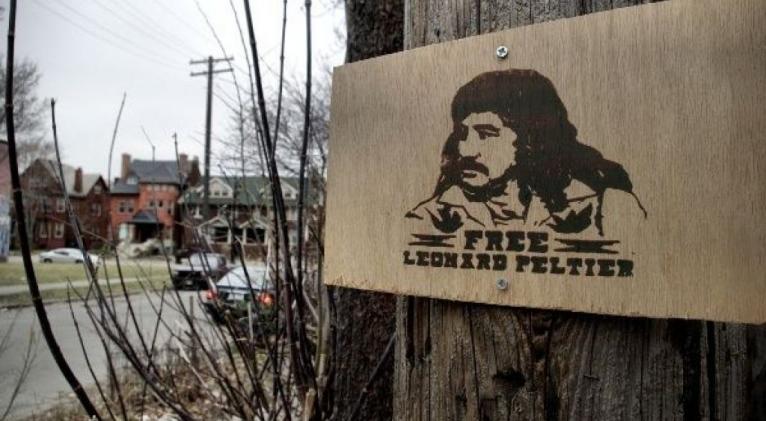Instead of Pardon, Obama Gave Leonard Peltier a Death Sentence
especiales

This year’s anniversary of the arrest of Leonard Peltier is not like any other that had passed as he marks his 41st year behind bars a few weeks after former President Barack Obama refused to grant him a pardon, which his lawyer and human rights groups said amounted to a death sentence for the 72-year-old Native American leader.
"I think it’s fair to say that if he doesn’t get commuted by President Obama, he’ll die in jail. He’s a very sick man," Peltier’s attorney Martin Garbus told Democracy Now! on Jan 18. just hours ahead of Obama’s decision.
"So, Obama’s not granting him clemency is like a sentence of death. Trump ain’t going to do it. And he’s very sick, and he’s not going to live past that time. I don’t want to be negative, but that’s the reality. He’s very sick, and he’s been in prison over 40 years, hard years, six years of solitary," he added.
RELATED: From Mumia to Peltier, US Political Prisoners Still Locked Up
Just a day earlier, Garbus had revealed, Pope Francis joined Amnesty International and other groups in putting pressure on Obama to free Peltier due to his poor health and lack of evidence against him.
"We are deeply saddened by the news that President Obama will not let Leonard go home," read a statement from Margaret Huang, executive director of Amnesty International USA last month. "The failure to act may have condemned him to die in prison."
Leonard Peltier has always maintained his innocence and has emphatically maintained that his continued persecution by the U.S. government is politically motivated.
Calls for clemency for the Indigenous leader intensified after Chelsea Manning, the former ex-U.S. soldier who leaked secret military documents, and Puerto Rican independence fighter Oscar Lopez Rivera were given commutations by Obama.
Even Amnesty International has taken up Peltier's cause, questioning the fairness of his trial and backing assertions that political considerations likely factored into his treatment by the U.S. justice system.
So why would U.S. authorities single out Peltier and seek his unjust imprisonment?
Peltier was a leading figure within the American Indian Movement during its peak in political activity in the 1970's. Active in defense of his people's interests and lands from a young age, Peltier rose quickly to occupy a prominent role within the movement.
In 1975, responding to a request by local indigenous people from the Pine Ridge Reservation, Peltier traveled to South Dakota. There he worked with the community helping provide security amidst political tensions and violence between rival groups on the reservation.
FBI officials, on a deliberate mission to weaken or destroy leftist organizations, believed that AIM activists were conspiring at Pine Ridge. “It was not an armed military camp hatching terrorist plans … It was a spiritual camp,” said Peltier.
On June 26, 1975, a massive shootout erupted, which included participants from AIM, the FBI, and paramilitaries hired by the tribal chairman who was opposed to AIM.
When the bullets stopped, two FBI agents and one Indigenous man by the name of Joseph Stuntz were dead.
Despite the participation of dozens of people, only AIM members Bob Robideau, Darrell Butler, and Leonard Peltier were brought up on charges related to the deaths of the FBI officials. Robideau and Butler were arrested and charged but ultimately acquitted.
Peltier, fearing that he would not receive a fair trial, fled to Canada. He would eventually be extradited back to the United States based on the testimony of Myrtle Poor Bear, who said she saw Peltier shoot the agents.
Poor Bear would eventually recant her statements. It is alleged she was not even present at Pine Ridge on the day in question.
Peltier's trial was held in North Dakota in 1977 and was presided over by Judge Paul Benson, an appointee of conservative President Richard Nixon.
Myrtle Poor Bear was not allowed to testify and submit to the jury that her previous statements were false. Other witnesses would later claim the FBI coerced them into testifying against Peltier. Key evidence that helped exonerate Robideau and Butler was not allowed to be introduced.
RELATED: 'Thank You Fidel': Puerto Rican Poet and Ex-Political Prisoner
The jury found Peltier guilty and he was sentenced to two consecutive life sentences. It would later be revealed that the prosecution hid thousands of documents related to the case, documents that could have helped prove Peltier's innocence.
Despite all this, Peltier was denied a retrial in 1986. The judge who presided over that trial, Gerald Heaney, even expressed concern about the administration of justice
He has also been consistently denied parole, most recently in 2009, due to his insistence that he is innocent.
Peltier is now 71-years-old and is not eligible for another parole hearing until 2024. This is why his supporters, who include many notable figures and celebrities, have called for U.S. authorities to release him on humanitarian grounds. Other have specifically called on President Obama to commute Peltier's sentence before the end of his term.













Add new comment